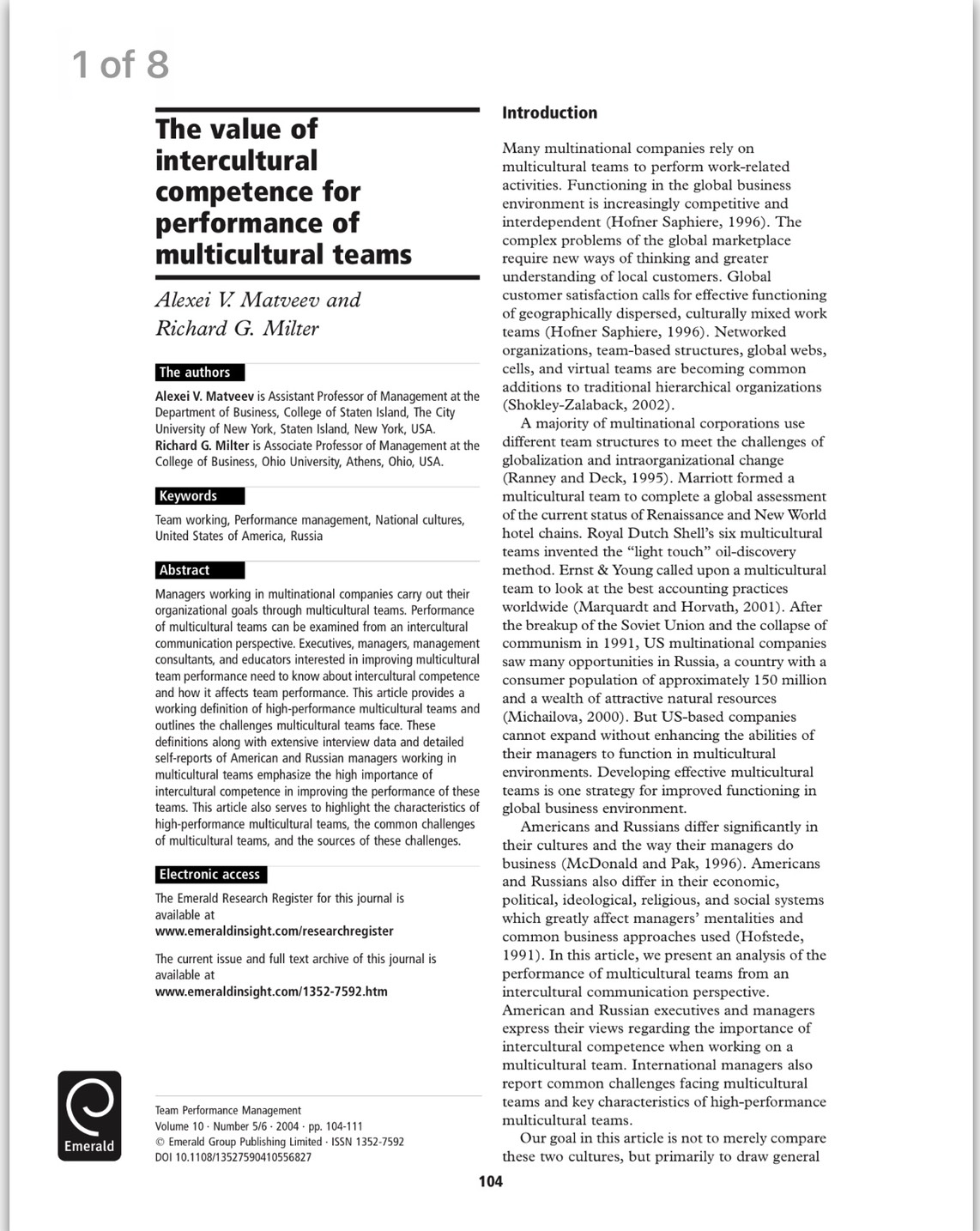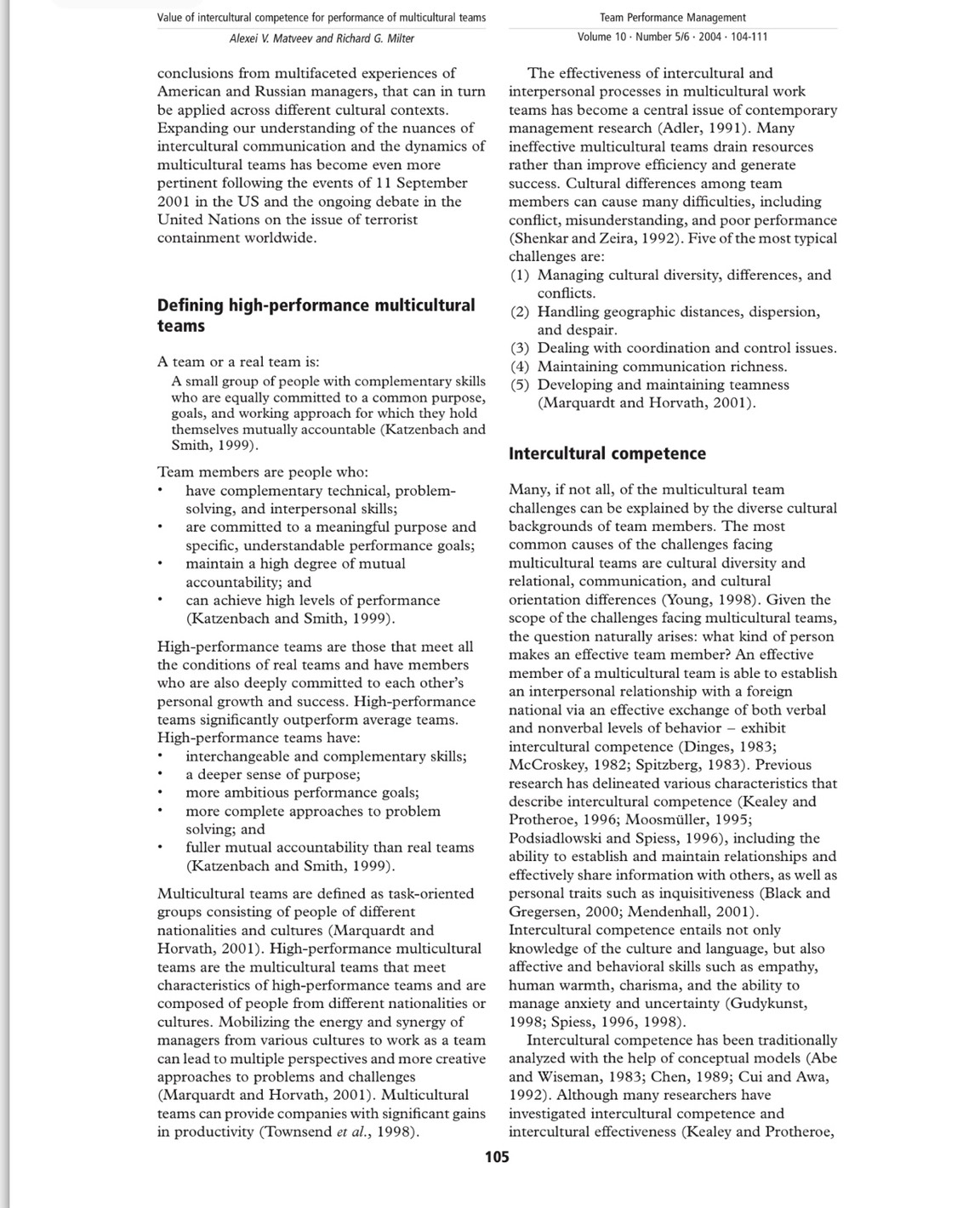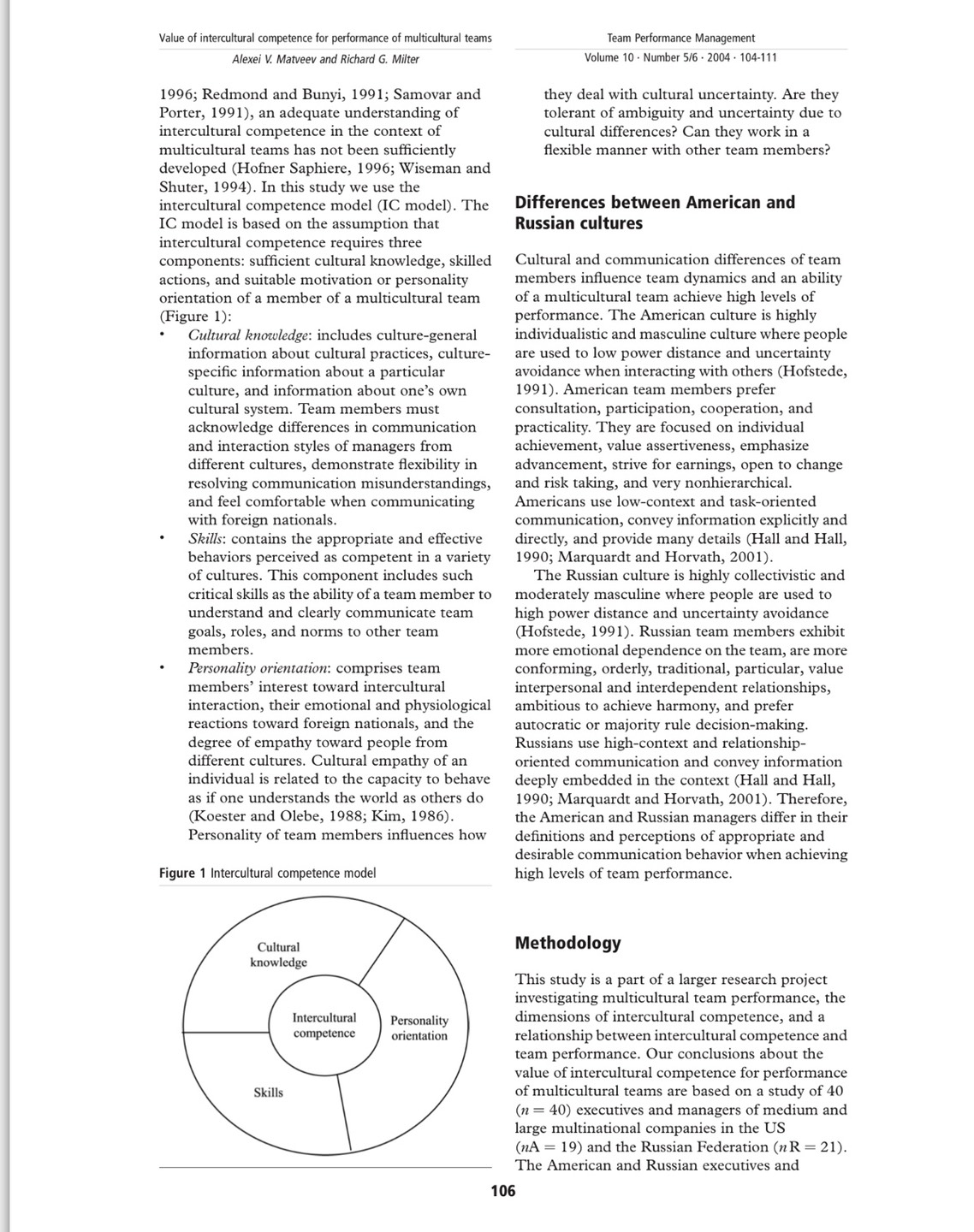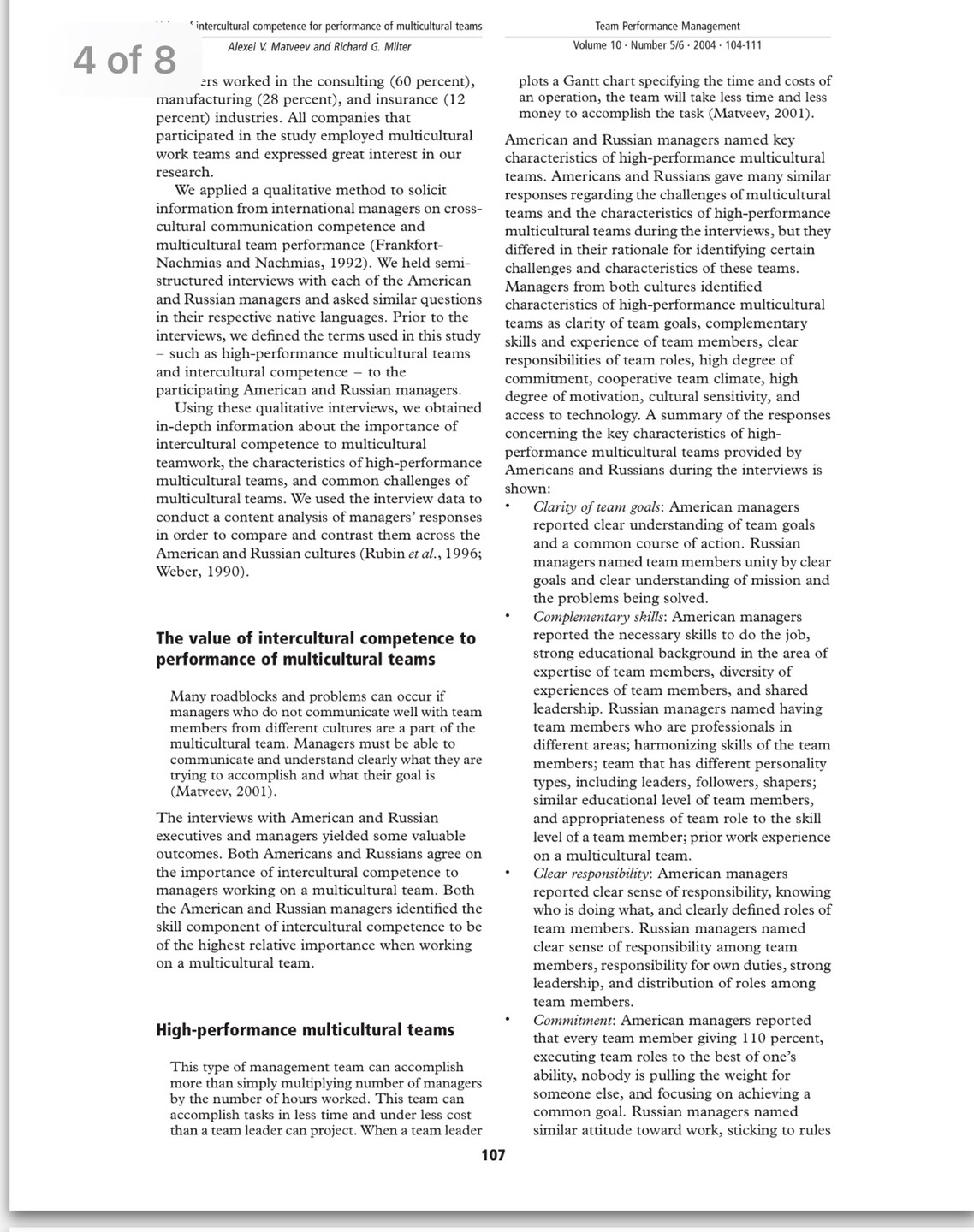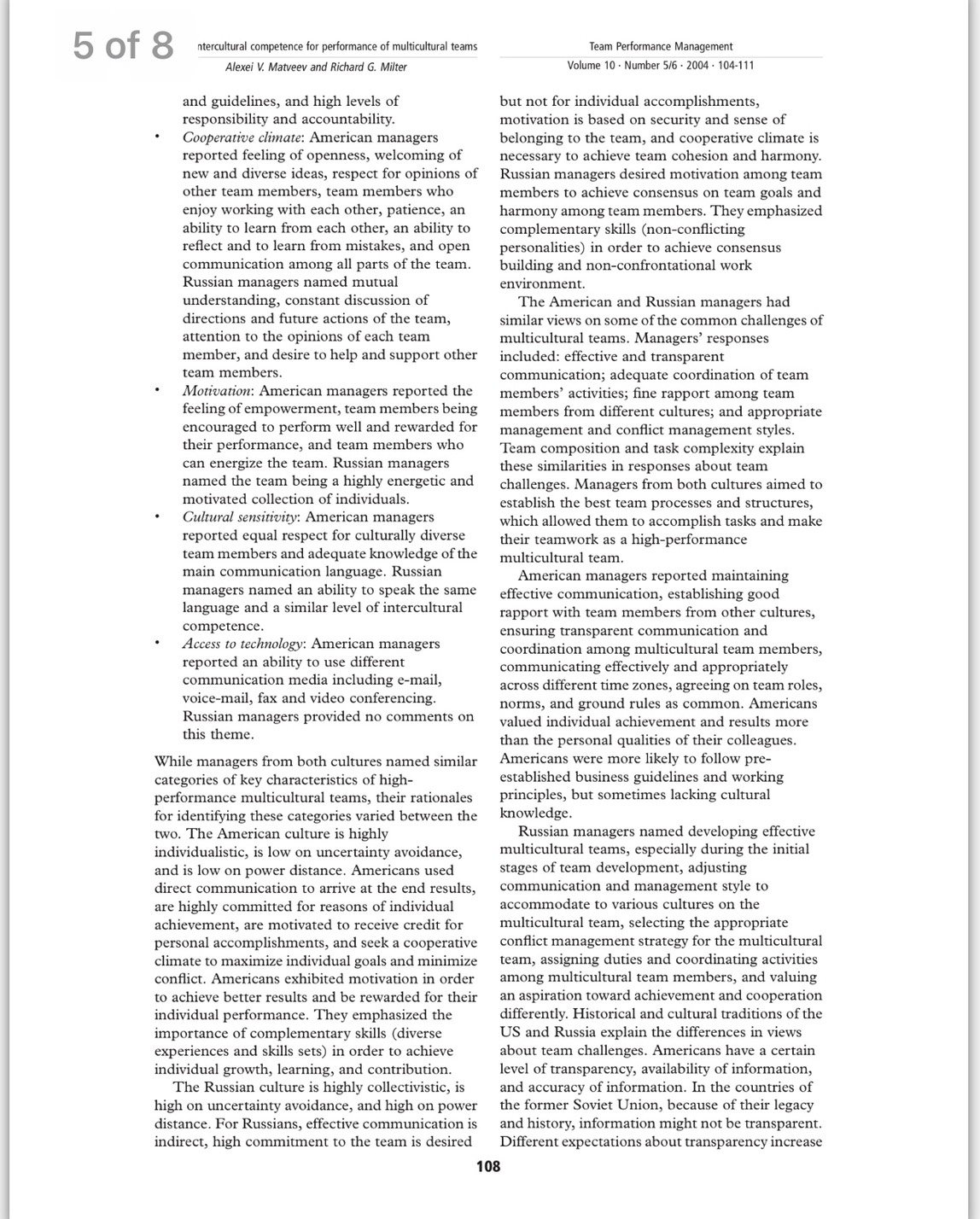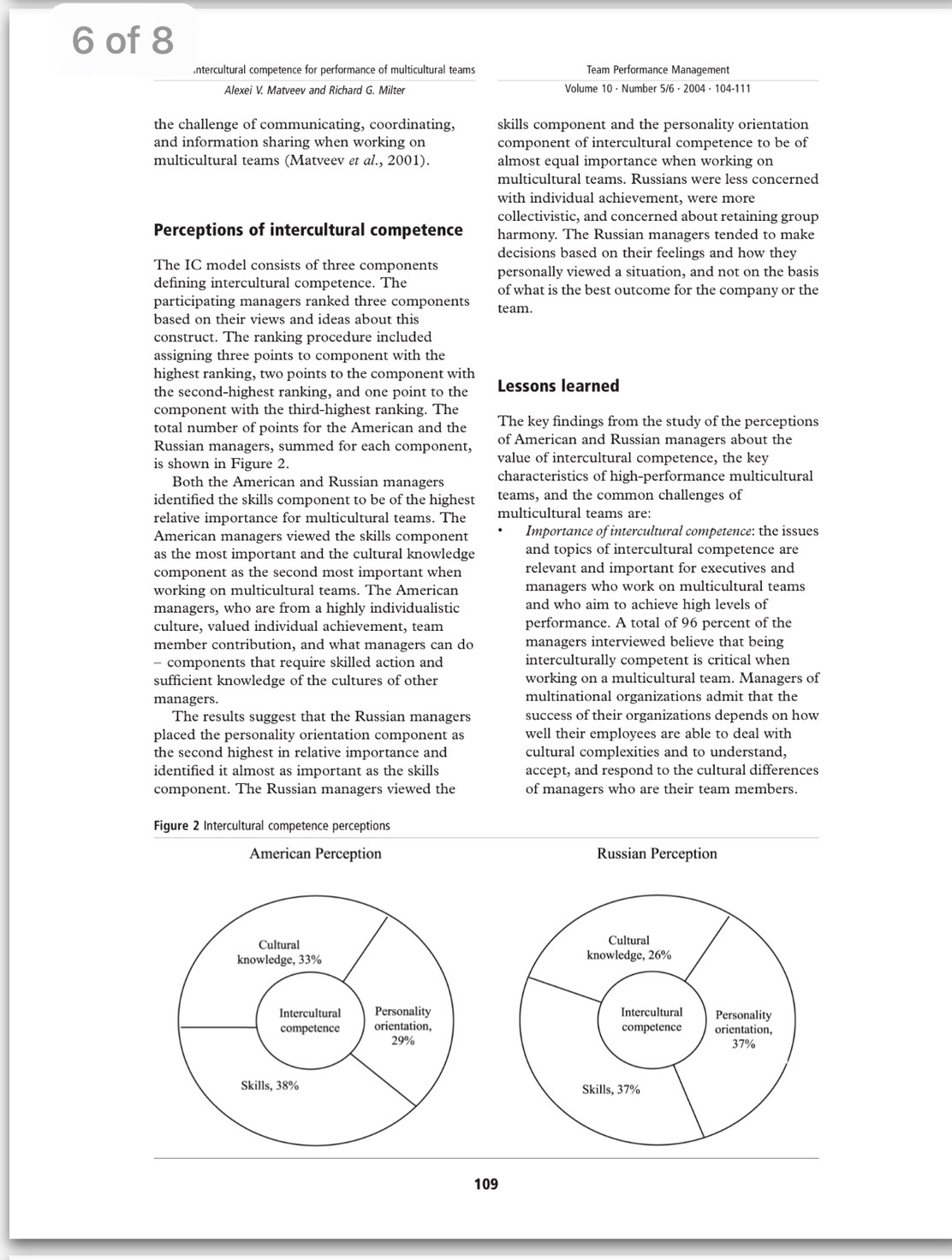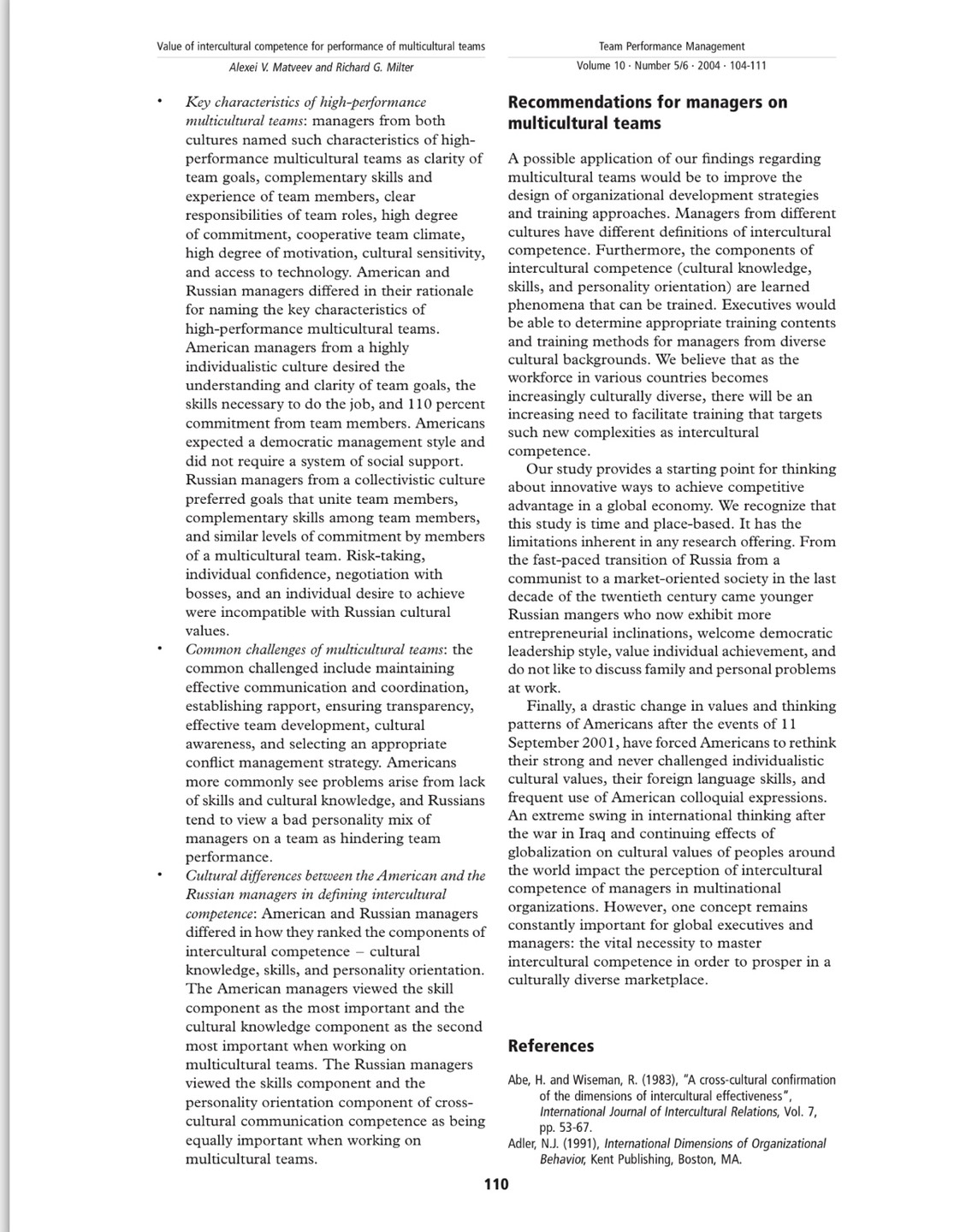Please find strong points and weak points of the article "the value of intercultural competence for performance of multicultural teams"
1 of 8 The value of Introduction intercultural Many multinational companies rely on multicultural teams to perform work-related competence for activities. Functioning in the global business performance of environment is increasingly competitive and interdependent (Hofner Saphiere, 1996). The multicultural teams complex problems of the global marketplace require new ways of thinking and greater understanding of local customers. Global Alexei V. Matveev and customer satisfaction calls for effective functioning Richard G. Milter of geographically dispersed, culturally mixed work teams (Hofner Saphiere, 1996). Networked organizations, team-based structures, global webs, The authors cells, and virtual teams are becoming common Alexei V. Matveev is Assistant Professor of Management at the additions to traditional hierarchical organizations Department of Business, College of Staten Island, The City (Shokley-Zalaback, 2002). University of New York, Staten Island, New York, USA. A majority of multinational corporations use Richard G. Milter is Associate Professor of Management at the different team structures to meet the challenges of College of Business, Ohio University, Athens, Ohio, USA. globalization and intraorganizational change Keywords (Ranney and Deck, 1995). Marriott formed a multicultural team to complete a global assessment Team working, Performance management, National cultures, of the current status of Renaissance and New World United States of America, Russia hotel chains. Royal Dutch Shell's six multicultural teams invented the "light touch" oil-discovery Abstract method. Ernst & Young called upon a multicultural Managers working in multinational companies carry out their team to look at the best accounting practices organizational goals through multicultural teams. Performance worldwide (Marquardt and Horvath, 2001). After of multicultural teams can be examined from an intercultural the breakup of the Soviet Union and the collapse of communication perspective. Executives, managers, management consultants, and educators interested in improving multicultural communism in 1991, US multinational companies team performance need to know about intercultural competence saw many opportunities in Russia, a country with a and how it affects team performance. This article provides a consumer population of approximately 150 million working definition of high-performance multicultural teams and and a wealth of attractive natural resources outlines the challenges multicultural teams face. These (Michailova, 2000). But US-based companies definitions along with extensive interview data and detailed cannot expand without enhancing the abilities of self-reports of American and Russian managers working in their managers to function in multicultural multicultural teams emphasize the high importance of environments. Developing effective multicultural intercultural competence in improving the performance of these teams. This article also serves to highlight the characteristics of teams is one strategy for improved functioning in high-performance multicultural teams, the common challenges global business environment. of multicultural teams, and the sources of these challenges. Americans and Russians differ significantly in their cultures and the way their managers do Electronic access business (Mcdonald and Pak, 1996). Americans The Emerald Research Register for this journal is and Russians also differ in their economic, available at political, ideological, religious, and social systems www.emeraldinsight.com/researchregister which greatly affect managers' mentalities and common business approaches used (Hofstede, The current issue and full text archive of this journal is 1991). In this article, we present an analysis of the available at www.emeraldinsight.com/1352-7592.htm performance of multicultural teams from an intercultural communication perspective. American and Russian executives and managers express their views regarding the importance of intercultural competence when working on a multicultural team. International managers also report common challenges facing multicultural Team Performance Management teams and key characteristics of high-performance Volume 10 . Number 5/6 . 2004 . pp. 104-111 multicultural teams. Emerald Emerald Group Publishing Limited . ISSN 1352-7592 Our goal in this article is not to merely compare DOI 10.1108/13527590410556827 these two cultures, but primarily to draw general 104Value of intercultural competence for performance of multicultural teams Team Performance Management Alexei V. Matveev and Richard G. Milter Volume 10 . Number 5/6 . 2004 . 104-111 conclusions from multifaceted experiences of The effectiveness of intercultural and American and Russian managers, that can in turn interpersonal processes in multicultural work be applied across different cultural contexts. eams has become a central issue of contemporary Expanding our understanding of the nuances of management research (Adler, 1991). Many intercultural communication and the dynamics of ineffective multicultural teams drain resources multicultural teams has become even more rather than improve efficiency and generate pertinent following the events of 11 September 2001 in the US and the ongoing debate in the success. Cultural differences among team members can cause many difficulties, including United Nations on the issue of terrorist conflict, misunderstanding, and poor performance containment worldwide. (Shenkar and Zeira, 1992). Five of the most typical challenges are: 1) Managing cultural diversity, differences, and Defining high-performance multicultural conflicts. teams (2) Handling geographic distances, dispersion, and despair. A team or a real team is: (3) Dealing with coordination and control issues. A small group of people with complementary skills (4) Maintaining communication richness. who are equally committed to a common purpose, (5) Developing and maintaining teamness goals, and working approach for which they hold (Marquardt and Horvath, 2001). themselves mutually accountable (Katzenbach and Smith, 1999) Team members are people who: Intercultural competence have complementary technical, problem- Many, if not all, of the multicultural team solving, and interpersonal skills; challenges can be explained by the diverse cultural are committed to a meaningful purpose and backgrounds of team members. The most specific, understandable performance goals; common causes of the challenges facing maintain a high degree of mutual multicultural teams are cultural diversity and accountability; and relational, communication, and cultural can achieve high levels of performance orientation differences (Young, 1998). Given the Katzenbach and Smith, 1999). scope of the challenges facing multicultural teams, High-performance teams are those that meet all the question naturally arises: what kind of person the conditions of real teams and have members makes an effective team member? An effective who are also deeply committed to each other's member of a multicultural team is able to establish personal growth and success. High-performance an interpersonal relationship with a foreign teams significantly outperform average teams. national via an effective exchange of both verbal High-performance teams have: and nonverbal levels of behavior - exhibit interchangeable and complementary skills; intercultural competence (Dinges, 1983; a deeper sense of purpose; McCroskey, 1982; Spitzberg, 1983). Previous more ambitious performance goals; research has delineated various characteristics that more complete approaches to problem describe intercultural competence (Kealey and solving; and Protheroe, 1996; Moosmuller, 1995; fuller mutual accountability than real teams Podsiadlowski and Spiess, 1996), including the (Katzenbach and Smith, 1999). ability to establish and maintain relationships and effectively share information with others, as well as Multicultural teams are defined as task-oriented personal traits such as inquisitiveness (Black and groups consisting of people of different Gregersen, 2000; Mendenhall, 2001). nationalities and cultures (Marquardt and Horvath, 2001). High-performance multicultural Intercultural competence entails not only teams are the multicultural teams that meet knowledge of the culture and language, but also affective and behavioral skills such as empathy, characteristics of high-performance teams and are composed of people from different nationalities or human warmth, charisma, and the ability to manage anxiety and uncertainty (Gudykunst, cultures. Mobilizing the energy and synergy of 1998; Spiess, 1996, 1998). managers from various cultures to work as a team Intercultural competence has been traditionally can lead to multiple perspectives and more creative analyzed with the help of conceptual models (Abe approaches to problems and challenges (Marquardt and Horvath, 2001). Multicultural and Wiseman, 1983; Chen, 1989; Cui and Awa, 1992). Although many researchers have teams can provide companies with significant gains in productivity (Townsend et al., 1998). investigated intercultural competence and intercultural effectiveness (Kealey and Protheroe, 105Value oi interculneal competence for pedumance of multicultural teams Alemi ll Marveevand iard G Miller 1996; Redmond and Bunyi, 1991; Samovar and Porter, 1991), an adequate understanding of intercultural competence in the context of multicultural teams has not been suiciently developed (Hefner Saphiere, 1996; Wiseman and Shuter, 1994). In this study we use the intercultural competence model (IC model). The IC model is based on the assumption that intercultural competence requires three components: sufficient cultural knowledge, skilled actions, and suitable motivation or personality orientation of a member of a multicultural team (Figure 1): ' Cultured knotuledge: includes culture-general information about cultural practices, culture- specic information about a particular culture, and information about one's own cultural system. Team members must acknowledge differences in communication and interaction styles of managers from different cultures, demonstrate exibility in resolving communication misunderstandings, and feel comfortable when communicating with foreign nationals. ' Skills: contains the appropriate and ellective behaviors perceived as competent in a variety of cultures. This component includes such critical skills as the ability of a team member to understand and clearly communicate team goals, roles, and norms to other team members. Personality orientation: comprises team members' interest toward intercultural interaction, their emotional and physiological reactions toward foreign nationals, and the degree of empathy toward people from di'erent cultures. Cultural empathy of an individual is related to the capacity to behave as if one understands the world as others do (Koester and Olebe, 1988; Kim, 1986). Personality of team members inuences how Figure 1 Intercultural competence model Team Performance Management Volume 10 - Number 5:6' 2004' Wat-111 they deal with cultural uncertainty. Are they tolerant of ambiguity and uncertainty due to cultural differences? Can they work in a exible manner with other team members? Differences between American and Russian cultures Cultural and communication differences of team members inuence team dynamics and an ability of a multicultural team achieve high levels of performance. The American culture is highly individualistic and masculine culture where people are used to low power distance and uncertainty avoidance when interacting with others (Hofstede, 199]). American team members prefer consultation, participation, cooperation, and practicality. They are focused on individual achievement, value assertiveness, emphasize advancement, strive for earnings, open to change and risk taking, and very nouhierarchical. Americans use low-context and task-oriented communication, convey information explicitly and directly, and provide many details (Hall and Hall, 1990; Marquardt and Horvath, 2001). The Russian culture is highly collectivistic and moderately masculine where people are used to high power distance and uncertainty avoidance (Hofstede, 1991). Russian team members exhibit more emotional dependence on the team, are more conforming, orderly, traditional, particular, value interpersonal and interdependent relationships, ambitious to achieve harmony, and prefer autocratic or majority rule decision-making. Russians use high-context and relationship- oriented communication and convey information deeply embedded in the context (Hall and Hall, 1990; Marquardt and Horvath, 2001). Therefore, the American and Russian managers di'er in their denitions and perceptions of appropriate and desirable communication behavior when achieving high levels of team performance. Methodology This study is a part of a larger research project investigating multicultural team performance, the dimensions of intercultural competence, and a relationship between intercultural competence and team performance. Our conclusions about the value of intercultural competence for performance of multicultural teams are based on a study of 40 (rt = 40) executives and managers of medium and large multinational companies in the US (nA = 19) and the Russian Federation (11R = 21). The American and Russian executives and 106 4of8 ' interculuial competence for performance of multicultural learns Merci it Maraudidtard. Miller are worked in the consulting (60 percent), manufacturing (28 percent), and insurance (12 percent) industries. All companies that participated in the study employed multicultural work teams and expressed great interest in our research. We applied a qualitative method to solicit information from international managers on cross- cultural communication competence and multicultural team performance (Frankfort- Nachmias and Nachmias, 1992). We held semi- structured interviews with each of the American and Russian managers and asked similar questions in their respective native languages. Prior to the interviews, we dened the terms used in this study such as highperformance multicultural teams and intercultural competence to the participating American and Russian managers. Using these qualitative interviews, we obtained in-depth information about the importance of intercultural competence to multicultural teamwork, the characteristics of high-performance multicultural teams, and common challenges of multicultural teams. We used the interview data to conduct a content analysis of managers' responses in order to compare and contrast them across the American and Russian cultures (Rubin er al., 1996; Weber, 1990). The value of intercultural competence to performance of multicultural teams Many roadblocks and problems can occur if managers who do not communicate well with team members from di'erent cultures are a part of the multicultural team. Managers must be able to communicate and understand clearly what they are trying to accomplish and what their goal is (Marveev, 2001). The interviews with American and Russian executives and managers yielded some valuable outcomes. Both Americans and Russians agree on the importance of intercultural competence to managers working on a multicultural team. Both the American and Russian managers identied the skill component of intercultural competence to be of the highest relative importance when working on a multicultural team. High-performance multicultural teams This type of management team can accomplish more than simply multiplying number of managers by the number of hours worked. This team can accomplish tasks in less time and under less cost than a team leader can project. When a team leader Teatn Performance Management Volume 1|)- Nunber 51'6 - 2004-1011411 plots a Gantt chart specifying the time and costs of an operation, the team will take less time and less money to accomplish the task (Matveev, 2001). American and Russian managers named key characteristics of high-performance multicultural teams. Americans and Russians gave many similar responses regarding the challenges of multicultural teams and the characteristics of high-performance multicultural teams during the interviews, but they differed in their rationale for identifying certain challenges and characteristics of these teams. Managers from both cultures identied characteristics of high-performance multicultural teams as clarity of team goals, complementary skills and experience of team members, clear responsibilities of team roles, high degree of commitment, cooperative team climate, high degree of motivation, cultural sensitivity, and access to technology. A summary of the responses concerning the key characteristics of high- performance multicultural teams provided by Americans and Russians during the interviews is shown: ' Clarity often: goals: American managers reported clear understanding of team goals and a common course of action. Russian managers named team members unity by clear goals and clear understanding of mission and the problems being solved. ' Complementary skills: American managers reported the necessary skills to do the job, Strong educational background in the area of expertise of team members, diversity of experiences of team members, and shared leadership. Russian managers named having team members who are professionals in different areas; harmonizing skills of the team members; team that has different personality types, including leaders, followers, shapers; similar educational level of team members, and appropriateness of team role to the skill level of a team member; prior work experience on a multicultural team. ' Clear respomibity: American managers reported clear sense of responsibility, knowing who is doing what, and clearly dened roles of team members. Russian managers named clear sense of responsibility among team members, responsibility for own duties, strong leadership, and distribution of roles among team members. - Commitment: American managers reported that every team member giving 110 percent, executing team roles to the best of one's ability, nobody is pulling the weight for someone else, and focusing on achieving a common goal. Russian managers named similar attitude toward work, sticking to rules 107 5 0f 8 ntetcul'mal competence for performs of mufcul'hiral teams Alexei In! Mature-v and Ridiard G Mill's! and guidelines, and high levels of responsibility and accountability. ' Cooperative climate: American managers reported feeling of openness, welcoming of new and diverse ideas, respect for opinions of other team members, team members who enjoy working with each other, patience, an ability to learn from each other, an ability to reect and to learn from mistakes, and open communication among all parts of the team. Russian managers named mutual understanding, constant discussion of directions and future actions of the team, attention to the opinions of each team member, and desire to help and support other team members. ' Motivation: American managers reported the feeling of empowerment, team members being encouraged to perform well and rewarded for their performance, and team members who can energize the team. Russian managers named the team being a highly energetic and motivated COIIection of individuals. ' Cultural tensio'm'gn American managers reported equal respect for culturally diverse team members and adequate knowledge of the main communication language. Russian managers named an ability to speak the same language and a similar level of intercultural competence. ' Access to technology: American managers reported an ability to use different communication media including e-mail, voice-mail, fax and video conferencing. Russian managers provided no comments on this theme. While managers from both cultures named similar categories of key characteristics of high- performance multicultural teams, their rationales for identifying these categories varied between the two. The American culture is highly individualistic, is low on uncertainty avoidance, and is low on power distance. Americans used direct communication to arrive at the end results, are highly committed for reasons of individual achievement, are motivated to receive credit for personal accomplishments, and seek a cooperative climate to maximize individual goals and minimize conict. Americans exhibited motivation in order to achieve better results and be rewarded for their individual performance. They emphasized the importance of complementary skills (diverse experiences and slo'lls sets) in order to achieve individual growth, learning, and contribution. The Russian culture is highly collectivistic, is high on uncertainty avoidance, and high on power distance. For Russians, effective communication is indirect, high commitment to the team is desired learn Performance Management Volume 10 - Nun-her SIG - 2004 -1IJ4-1l1 but not for individual accomplishments, motivation is based on security and sense of belonging to the team, and cooperative climate is necessary to achieve team cohesion and harmony. Russian managers desired motivation among team members to achieve consensus on team goals and harmony among team members. They emphasized complementary skills (non-conicting personalities) in order to achieve consensus building and non-confrontational work environment. The American and Russian managers had similar views on some of the common challenges of multicultural teams. Managers' responses included: eective and transparent communication; adequate coordination of team members' activities; ne rapport among team members from different cultures; and appropriate management and conict management styles. Team composition and task complexity explain these similarities in responses about team challenges. Managers from both cultures aimed to establish the best team processes and structures, which allowed them to accomplish tasks and make their teamwork as a high-performance multicultural team. American managers reported maintaining effective communication, establishing good rapport with team members from other cultures, ensuring transparent communication and coordination among multicultural team members, communicating eectively and appropriately across different time zones, agreeing on team roles, norms, and ground rules as common. Americans valued individual achievement and results more than the personal qualities of their colleagues. Americans were more likely to follow pre- established business guidelines and working principles, but sometimes lacking cultural knowledge. Russian managers named developing effective multicultural teams, especially during the initial stages of team development, adjusting communication and management style to accommodate to various cultures on the multicultural team, selecting the appropriate conict management strategy for the multicultural team, assigning duties and coordinating activities among multicultural team members, and valuing an aspiration toward achievement and cooperation differently. Historical and cultural traditions of the US and Russia explain the differences in views about team challenges. Americans have a certain level of transparency, availability of information, and accuracy of information. In the countries of the former Soviet Union, because of their legacy and history, information might not be transparent. Di'erent expectations about transparency increase sofa .ntercululal competence for performance of rnultimllural teams Alexei It Manner and Richard G. Milrer the challenge of communicating, coordinating, and information sharing when working on multicultural teams (Matveev at at, 2001). Perceptions of intercultural competence The IC model consists of three components dening intercultural competence. The participating managers ranked three components based on their views and ideas about this construct. The ranking procedure included assigning three points to component with the highest ranking, two points to the component with the second-highest ranking, and one point to the component with the third~highest ranking. The total number of points for the American and the Russian managers, summed for each component, is shown in Figure 2. Both the American and Russian managers identied the skills component to be of the highest relative importance for multicultural teams. The American managers viewed the skills component as the most important and the cultural knowledge component as the second most important when working on multicultural teams. The American managers, who are from a highly individualistic culture, valued individual achievement, team member contribution, and what managers can do v components that require skilled action and sufcient knowledge of the cultures of other managers. The results suggest that the Russian managers placed the personality orientation component as the second highest in relative importance and identied it almost as important as the skills component. The Russian managers viewed the Figure 2 Intercultural competence perceptions American Perception Cultural knowledge. 33% Skills. 38% Team Performance Management Volume 1|] - Nunbet SIG - 20M - 104-111 skills component and the personality orientation component of intercultural competence to be of almost equal importance when working on multicultural teams. Russians were less concerned with individual achievement, were more collectivistic, and concerned about retaining group harmony. The Russian managers tended to make decisions based on their feelings and how they personally viewed a situation, and not on the basis of what is the best outcome for the company or the team. Lessons learned The key ndings from the study of the perceptions of American and Russian managers about the value of intercultural competence, the key characteristics of high-performance multicultural teams, and the common challenges of multicultural teams are: - Imparmnce affirmations! competence: the issues and topics of intercultural competence are relevant and important for executives and managers who work on multicultural teams and who aim to achieve high levels of performance. A total of 96 percent of the managers interviewed believe that being interculturally competent is critical when working on a multicultural team. Managers of multinational organizations admit that the success of their organizations depends on how well their employees are able to deal with cultural complexities and to understand, accept, and respond to the cultural diemnCes of managers who are their team members. Russian Perception Skills, 37% Value of intercultural competence for performance of multicultural teams Team Performance Management Alexei V. Matveev and Richard G. Milter Volume 10 . Number 5/6 - 2004 . 104-111 Key characteristics of high-performance Recommendations for managers on multicultural teams: managers from both cultures named such characteristics of high- multicultural teams performance multicultural teams as clarity of A possible application of our findings regarding team goals, complementary skills and multicultural teams would be to improve the experience of team members, clear design of organizational development strategies responsibilities of team roles, high degree and training approaches. Managers from different of commitment, cooperative team climate, cultures have different definitions of intercultural high degree of motivation, cultural sensitivity, competence. Furthermore, the components of and access to technology. American and intercultural competence (cultural knowledge, Russian managers differed in their rationale skills, and personality orientation) are learned for naming the key characteristics of phenomena that can be trained. Executives would high-performance multicultural teams. be able to determine appropriate training contents American managers from a highly and training methods for managers from diverse individualistic culture desired the cultural backgrounds. We believe that as the understanding and clarity of team goals, the workforce in various countries becomes skills necessary to do the job, and 110 percent increasingly culturally diverse, there will be an commitment from team members. Americans increasing need to facilitate training that targets expected a democratic management style and such new complexities as intercultural did not require a system of social support. competence. Russian managers from a collectivistic culture Our study provides a starting point for thinking preferred goals that unite team members, about innovative ways to achieve competitive complementary skills among team members, advantage in a global economy. We recognize that and similar levels of commitment by members this study is time and place-based. It has the of a multicultural team. Risk-taking, limitations inherent in any research offering. From individual confidence, negotiation with the fast-paced transition of Russia from a bosses, and an individual desire to achieve communist to a market-oriented society in the last were incompatible with Russian cultural decade of the twentieth century came younger values. Russian mangers who now exhibit more Common challenges of multicultural teams: the entrepreneurial inclinations, welcome democratic common challenged include maintaining leadership style, value individual achievement, and do not like to discuss family and personal problems effective communication and coordination, at work. establishing rapport, ensuring transparency, Finally, a drastic change in values and thinking effective team development, cultural patterns of Americans after the events of 11 awareness, and selecting an appropriate September 2001, have forced Americans to rethink conflict management strategy. Americans their strong and never challenged individualistic more commonly see problems arise from lack cultural values, their foreign language skills, and of skills and cultural knowledge, and Russians frequent use of American colloquial expressions. tend to view a bad personality mix of An extreme swing in international thinking after managers on a team as hindering team the war in Iraq and continuing effects of performance globalization on cultural values of peoples around Cultural differences between the American and the the world impact the perception of intercultural Russian managers in defining intercultural competence of managers in multinational competence: American and Russian managers organizations. However, one concept remains differed in how they ranked the components of constantly important for global executives and intercultural competence - cultural managers: the vital necessity to master knowledge, skills, and personality orientation. intercultural competence in order to prosper in a The American managers viewed the skill culturally diverse marketplace. component as the most important and the cultural knowledge component as the second most important when working on References multicultural teams. The Russian managers viewed the skills component and the Abe, H. and Wiseman, R. (1983), "A cross-cultural confirmation personality orientation component of cross- of the dimensions of intercultural effectiveness", cultural communication competence as being International Journal of Intercultural Relations, Vol. 7, equally important when working on pp. 53-67 Adler, N.J. (1991), International Dimensions of Organizational multicultural teams. Behavior, Kent Publishing, Boston, MA. 110
